THE LIVING TAO : TIMELESS WISDOM FOR THE MODERN WORLD
This is a podcast dedicated to exploring the profound, yet elusive True Tao (真道). Acknowledging that the essence of Tao is beyond traditional discourse and expression, this series seeks to demystify Taoist principles and adapt them for contemporary listeners. Each episode offers a blend of ancient wisdom and modern insights, providing practical guidance for navigating the complexities of today’s world. Whether you’re a seasoned practitioner or new to the path, join us in discovering how the timeless wisdom of Tao can be lived out in the here and now.
Episodes
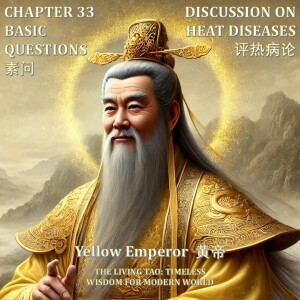
Monday Nov 25, 2024
Monday Nov 25, 2024
This Chapter is a dialogue from the Yellow Emperor’s Classic of Internal Medicine, specifically Chapter 33, exploring various heat illnesses and their diagnoses. The Yellow Emperor, a mythical figure, questions Qi Bo, a renowned physician, about symptoms, causes, and treatments for several conditions. These conditions include Yin-Yang imbalance, wind-reversal, labor-related wind, and kidney-related wind, each explained through detailed discussions of their etiology and appropriate therapies. The dialogue highlights the importance of pulse diagnosis, and the relationship between the body's essence and pathogenic qi in determining prognosis.
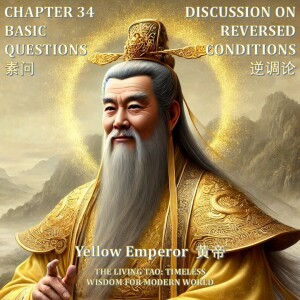
Monday Nov 25, 2024
Monday Nov 25, 2024
This Chapter is a dialogue from the Yellow Emperor's Classic of Internal Medicine, exploring various imbalances of yin and yang energy within the body. The Yellow Emperor, posing as a student, questions Qi Bo, his teacher, about different symptoms such as heat, cold, and numbness, attributing them to specific energy deficiencies or excesses in different organs. The discussion covers the importance of the flow of energy (qi) through meridians and the consequences of its disruption. Qi Bo explains the underlying causes and the resulting illnesses, offering insights into Traditional Chinese Medicine principles. The dialogue concludes with a discussion of respiratory issues related to the flow of qi.
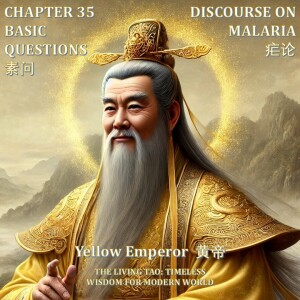
Monday Nov 25, 2024
Monday Nov 25, 2024
This Chapter is a dialogue from the Yellow Emperor's Classic of Internal Medicine, exploring the nature of malaria. Huangdi (the Yellow Emperor) questions Qi Bo, a renowned physician, about the disease's cyclical fevers, varied presentations (chills then heat, or vice versa), and underlying mechanisms involving the interplay of yin and yang energies. Qi Bo explains malaria's onset, progression, and treatment based on the movement of pathogenic qi along the body's meridians and its interaction with the defensive qi. The discussion covers different types of malaria and emphasizes the importance of timing in treatment, advising against intervention during the disease's peak.
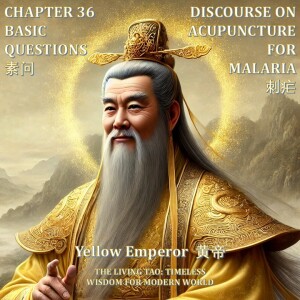
Monday Nov 25, 2024
Monday Nov 25, 2024
The Yellow Emperor's Classic of Internal Medicine, specifically Chapter 36, details acupuncture treatments for malaria. The text describes various malaria presentations based on affected meridians (energy channels), outlining unique symptoms and corresponding acupuncture points for needling. Different pulse diagnoses further guide treatment choices, including bloodletting techniques. Timing of treatment is crucial, with the optimal time being just before the onset of symptoms. The text also addresses specific symptoms, such as headache, back pain, and chills, with targeted acupuncture approaches.
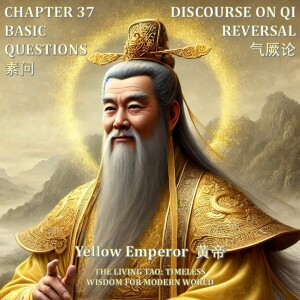
Monday Nov 25, 2024
Monday Nov 25, 2024
This Chapter from the Yellow Emperor’s Classic of Internal Medicine details a dialogue between the Yellow Emperor and Qi Bo concerning qi reversal, the transfer of heat or cold between the body's five organs and six bowels. The text meticulously describes the various symptoms and pathologies resulting from these transfers, ranging from mild conditions like nosebleeds to life-threatening illnesses. The severity and specific symptoms are carefully correlated to the organs involved and the nature (hot or cold) of the transferred qi. The discussion ultimately aims to explain disease etiology and prognosis based on this model of energetic imbalance.
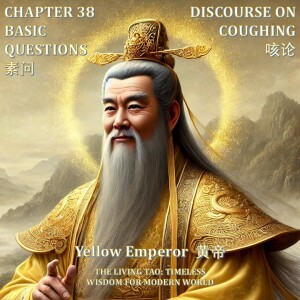
Monday Nov 25, 2024
Monday Nov 25, 2024
This Chapter is a dialogue from the Huangdi Neijing, an ancient Chinese medical text, focusing on coughs. The Yellow Emperor questions Qi Bo, a renowned physician, about the causes and symptoms of coughs stemming from various organs (lungs, heart, liver, spleen, kidneys) and bowels. Qi Bo explains that coughs originate from imbalances in these organs, manifest with specific symptoms depending on the affected organ, and can spread between organs if untreated. The dialogue concludes with Qi Bo outlining treatment strategies based on the affected organ or bowel. The text emphasizes the interconnectedness of the body's systems in the context of disease.
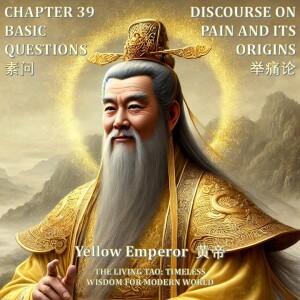
Monday Nov 25, 2024
Monday Nov 25, 2024
The Yellow Emperor's Classic of Internal Medicine, specifically Chapter 39, explores the nature of pain. A dialogue between the Yellow Emperor and Qi Bo investigates the causes of various pains, attributing them to imbalances of qi (vital energy) and the influence of cold and heat on the body's meridians. Diagnosis is discussed through observation of color and palpation of the pulse. Finally, the text links different emotional states to specific qi disturbances, explaining how these emotional imbalances can manifest as various illnesses.
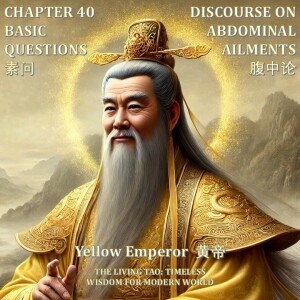
Monday Nov 25, 2024
Monday Nov 25, 2024
This Chapter is a dialogue from the Yellow Emperor’s Classic of Internal Medicine, a foundational text of Traditional Chinese Medicine. Huangdi, the Yellow Emperor, questions Qi Bo, a renowned physician, about various abdominal ailments. Qi Bo diagnoses and details treatments for conditions such as drum distention, blood dryness, and latent obstruction, offering insights into their causes and prognosis. The discussion also touches upon the importance of dietary regulation and the appropriate use of herbal and mineral remedies, emphasizing the need for a balanced approach to treatment. Finally, it addresses the relationship between fever, pain, and the flow of yang qi.
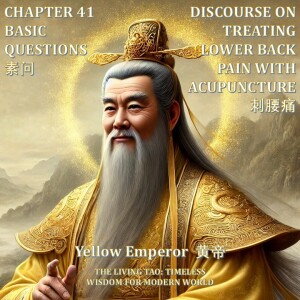
Monday Nov 25, 2024
Monday Nov 25, 2024
This Chapter is an excerpt from the Yellow Emperor's Classic of Internal Medicine, specifically Chapter 41, focusing on acupuncture treatment for lower back pain. The dialogue between the Yellow Emperor and Qi Bo details various types of lower back pain, each associated with a specific meridian in traditional Chinese medicine. For each meridian-related pain, the text specifies acupuncture points, techniques (including bloodletting), and seasonal considerations. The text also provides instructions for related symptoms like constipation and abdominal fullness. Finally, it concludes with additional advice regarding needle application and directional treatment.
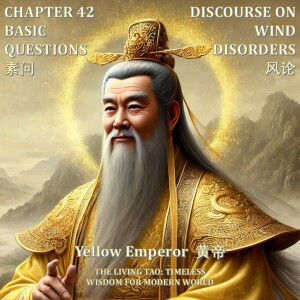
Monday Nov 25, 2024
Monday Nov 25, 2024
The Yellow Emperor's Classic of Internal Medicine, specifically Chapter 42, explores the nature and effects of wind in traditional Chinese medicine. The text details various wind-related illnesses, their symptoms, and diagnoses, distinguishing between internal and external manifestations. Different types of wind are categorized based on affected organs and seasons. Diagnostic methods are described, focusing on observing complexion changes in specific areas of the body. The dialogue format between the Yellow Emperor and Qi Bo provides a clear explanation of the theory and practice surrounding wind illnesses.

The Living Tao
Welcome to The Living Tao: Timeless Wisdom for the Modern World—your guide to living a life of balance, wisdom, and inner peace. Inspired by the profound teachings of ancient masters, this podcast explores the enduring relevance of these timeless insights in today’s fast-paced world.
Taoist teachings emphasize living in harmony with the natural flow of life—the Tao, or "the Way." This philosophy invites us to embrace simplicity, cultivate humility, and find peace by aligning ourselves with the rhythms of the universe. At its heart, Taoism encourages us to let go of resistance, shed the distractions of ego, and discover the profound serenity that comes from living authentically and in tune with our true nature.
The Tao Te Ching, attributed to Laozi, is one of the most influential texts in Taoism and serves as a cornerstone of our discussions. Its poetic verses guide us to reflect on themes like balance, self-awareness, and effortless action, or wu wei. These teachings are not bound by time or culture—they resonate just as powerfully today, offering insights that help us navigate the complexities of modern life with grace and equanimity.
Each episode of The Living Tao will uncover practical wisdom rooted in these ancient teachings, presenting it in ways that are both accessible and transformative. Whether it's understanding the art of stillness in a world of constant movement, finding clarity amid chaos, or exploring the paradoxes of strength through softness, you’ll discover tools and perspectives to enrich your life and deepen your connection to the world around you.
Whether you're a seasoned practitioner familiar with the Taoist path or a newcomer drawn to its gentle yet profound philosophy, this podcast offers something for everyone. Together, we'll explore how these age-old principles can help us embrace change, cultivate mindfulness, and find a sense of purpose and inner peace in the face of life's challenges.
Join us on this journey of self-discovery, as we bring the wisdom of the Tao into the present moment. Let the timeless truths of this ancient tradition inspire and empower you to live a more harmonious and enlightened life. Tune in, reflect, and allow the teachings of The Living Tao to guide you back to the essence of who you are.








